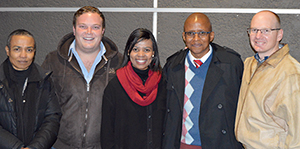
Prof Shirley Anne Tate, Associate Professor
at the University of Leeds; Eddie de Wet and
Emme-Lancia Faro, both from Student
Communities; Pura Mgolombane, Dean of
Student Affairs; and Dr WP Wahl, Assistant
Director of Student Communities.
Photo: Qhamani Tshazi
Prof Shirley Anne Tate from the University of Leeds in the United Kingdom inspired students at the second Academic Conversation held at the University of the Free State on the Bloemfontein Campus.
“Academics such as Prof Tate play a vital role in building bridges between students with high demands of ‘transformation’ and university managements that struggle to meet students halfway.”
These were the words of Jani Swart, current Primaria of Welwitschia residence, who attended the dialogue session. She said, however, she wished that more students had the opportunity and willingness to be guided by Prof Tate.
Prof Tate is an Associate Professor in Race and Culture at the Centre for Ethnicity and Racism Studies, School of Sociology and Social Policy at the University of Leeds. She is also a visiting Professor and Research Fellow at the Institute for Reconciliation and Social Justice at UFS.
Professor Tate captivated the students when she addressed them on the topic of Wellbeing in Higher Education Institutions.
The Academic Conversation was hosted by the Office of Student Affairs on 1 August 2016.